HFH Lesson Schedule
Monday- HFH instruction available from 1 pm
Tuesday- Unavailable
Wednesday- HFH instruction available from 1 pm
Thursday- HFH instruction available from 1 pm
Friday-HFH instruction available from 1 pm
Saturday & Sunday- Unavailable
Pricing:
$30/hour individual private
Any questions?
Heartfelthorsemanship@yahoo.com
LESSONS
Above: Hannah riding pony in Atlanta GA
HeartFelt Horsemanship lessons start out teaching you the basic way of communicating with your horse, understanding his or her Personality, and choosing the right path of training for you and your horse. If you can't or don't want to ride, Heart Felt Horsemanship will help you build a strong bond on the ground.
HFH shows you that love, trust, and understanding is the key to a good relationship with your horse.
Hannah teaches communication on the ground and the games that horses play with each other.
HFH Lessons will help you solve problems on the ground, and in the saddle.
Notes of Horse behavior:
Horse behavior is something you need to learn, before attempting to teach or train your horse.
It is important to know what a horse does and why he does it. It may not make sense to us why he does some of the things he does, but to him it makes perfect sense. You need know some horse psychology in order to properly teach your horse.
Now, you may, or may not know horse psychology.
Horses have a built in fight or flight response mechanism. A horse will always try to flee what he perceives as a dangerous or scary situation. However, if backed into a corner, or if he sees no other way out, he will fight.
Horses are prey animals and their instinct is to flee from predators. This is a part of horse behavior that is inherited and instinctual.
Guess what we are?, predators! A horse perceives us as predators until they know that they can trust us not to hurt, kill or eat them. It is imperative to gain your horse's trust and respect if you are to have a relationship with him. Trust and respect are not gained by physical abuse or punishment. It is gained through knowledge and mutual respect.
Some horse behavior is instinctual and others are learned behaviors. Things Such as cribbing or licking, and weaving are examples of learned behaviors. Pawing the fence, and fence walking are other learned behaviors.
Horses are herd animals, And learn from the examples around them, that includes: Humans, other animals, and other horses. They have highly developed social behaviors that hold the group together and keeps everyone in their place. They have and defend a strict pecking order within the herd. Once the pecking order is established, the lower horse will always give way to the higher ranking horse.
There are many different horse training techniques used to teach the same thing. If one method does not work for your horse, find one that will. Never be afraid to try something different. All horses are not the same, so you will have to adjust your training methods to allow your horse to progress at his own pace.
Horses learn mostly by trial and error. If they try one thing and it doesn't work, they will try something else. When they get it right, they remember. The next time their in that same situation they will do whatever worked for them the last time.
Horses have an excellent memory. They will forgive if you make a mistake, but they will never forget. They have also developed a great visual memory.
Horses also have a remarkable sensory system that allows them to detect sights, sounds, smells or movements. They are constantly on the look out for predators. In the wild, they had to be, or somebody was going to be lunch. Living in herds, they have more eyes and ears to be on the lookout.
Horses basically learn by association. If a horse hears a rustling bush and then sees a predator step out, he immediately associates a rustling bush with a predator. So the next time he hears the rustling bush, it triggers his flight response to get away from the predator before he steps out.
In a herd situation, the lower horses will look to the lead horse for guidance in these situations. If the lead horse runs, they no they better get moving. If the lead horse stands to fight, the will all stand behind him. This is instinctual horse behavior, the survival instinct.
This is why it is so important that you establish yourself as leader of the pack. Your horse will look to you for guidance in a scary situation. The main thing is to stay calm in any situation. If your horse feels, and he can feel it, that you are nervous or upset, he will get more nervous and upset. This doesn't lead to anything good.
One of the basics in learning equine behavior is to never try and rush your horse to learn something that he isn't ready for. Take the time it takes to teach it correctly. If you try and rush the process you will only end up frustrating the horse and yourself.
Not all horses learn at the same pace. Your horse may learn something new in a matter of minutes, whereas my horse may take a couple of days.
Always remember, if your trying to teach your horse something new, and he's just not getting it, try a different approach. All horse trainers would like for you to believe that their way is the best way, but that may not be the case for all horses.
Most of the time, if a horse will not do what your asking, it's not because he's being defiant or hard headed, it's because you're not asking in the right way. He could be acting out of fear or confusion. It is important to know your horse and know when he's be defiant or just plain scared or confused.
Hannah teaches communication on the ground and the games that horses play with each other.
HFH Lessons will help you solve problems on the ground, and in the saddle.
Notes of Horse behavior:
Horse behavior is something you need to learn, before attempting to teach or train your horse.
It is important to know what a horse does and why he does it. It may not make sense to us why he does some of the things he does, but to him it makes perfect sense. You need know some horse psychology in order to properly teach your horse.
Now, you may, or may not know horse psychology.
Horses have a built in fight or flight response mechanism. A horse will always try to flee what he perceives as a dangerous or scary situation. However, if backed into a corner, or if he sees no other way out, he will fight.
Horses are prey animals and their instinct is to flee from predators. This is a part of horse behavior that is inherited and instinctual.
Guess what we are?, predators! A horse perceives us as predators until they know that they can trust us not to hurt, kill or eat them. It is imperative to gain your horse's trust and respect if you are to have a relationship with him. Trust and respect are not gained by physical abuse or punishment. It is gained through knowledge and mutual respect.
Some horse behavior is instinctual and others are learned behaviors. Things Such as cribbing or licking, and weaving are examples of learned behaviors. Pawing the fence, and fence walking are other learned behaviors.
Horses are herd animals, And learn from the examples around them, that includes: Humans, other animals, and other horses. They have highly developed social behaviors that hold the group together and keeps everyone in their place. They have and defend a strict pecking order within the herd. Once the pecking order is established, the lower horse will always give way to the higher ranking horse.
There are many different horse training techniques used to teach the same thing. If one method does not work for your horse, find one that will. Never be afraid to try something different. All horses are not the same, so you will have to adjust your training methods to allow your horse to progress at his own pace.
Horses learn mostly by trial and error. If they try one thing and it doesn't work, they will try something else. When they get it right, they remember. The next time their in that same situation they will do whatever worked for them the last time.
Horses have an excellent memory. They will forgive if you make a mistake, but they will never forget. They have also developed a great visual memory.
Horses also have a remarkable sensory system that allows them to detect sights, sounds, smells or movements. They are constantly on the look out for predators. In the wild, they had to be, or somebody was going to be lunch. Living in herds, they have more eyes and ears to be on the lookout.
Horses basically learn by association. If a horse hears a rustling bush and then sees a predator step out, he immediately associates a rustling bush with a predator. So the next time he hears the rustling bush, it triggers his flight response to get away from the predator before he steps out.
In a herd situation, the lower horses will look to the lead horse for guidance in these situations. If the lead horse runs, they no they better get moving. If the lead horse stands to fight, the will all stand behind him. This is instinctual horse behavior, the survival instinct.
This is why it is so important that you establish yourself as leader of the pack. Your horse will look to you for guidance in a scary situation. The main thing is to stay calm in any situation. If your horse feels, and he can feel it, that you are nervous or upset, he will get more nervous and upset. This doesn't lead to anything good.
One of the basics in learning equine behavior is to never try and rush your horse to learn something that he isn't ready for. Take the time it takes to teach it correctly. If you try and rush the process you will only end up frustrating the horse and yourself.
Not all horses learn at the same pace. Your horse may learn something new in a matter of minutes, whereas my horse may take a couple of days.
Always remember, if your trying to teach your horse something new, and he's just not getting it, try a different approach. All horse trainers would like for you to believe that their way is the best way, but that may not be the case for all horses.
Most of the time, if a horse will not do what your asking, it's not because he's being defiant or hard headed, it's because you're not asking in the right way. He could be acting out of fear or confusion. It is important to know your horse and know when he's be defiant or just plain scared or confused.
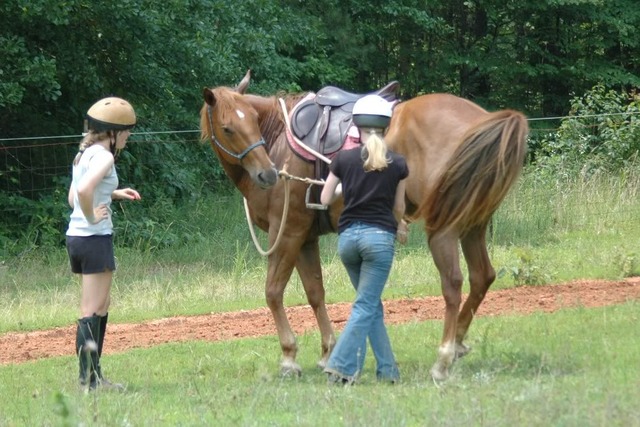
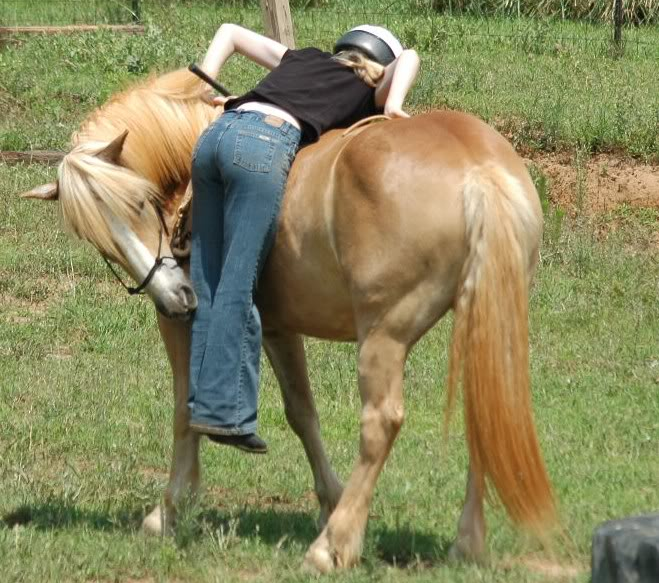
"HFH is the ultimate way to become one with your horse! Hannah Willis has taken Natural Horsemanship tools, along with her own knowledge to develop an amazing program. Without Hannah, my paint gelding Sarge may to this day still be terrified of any and every horse trailer. Hannah worked with Sarge for three days max, and he now loads with a point of the finger! Hannah showed me how to tell whether Sarge is left, or right brain, and what tactics to use depending on his frame of mind. Hannah also rode Sarge for fifteen minutes, and when I remounted him the difference in his movement could be clearly felt! He was much more balanced and responsive to my leg and rein cues. I owe Hannah a huge THANK YOU for all that she's done for me and my horse Sarge! Thanks to her we now work as partners, and respect each other so much more! Thank you, Hannah!!" - Ellen Adams and her horse Super Sarge (Pictured above)
Services:
Lessons
" I believe if you are having trouble in your horsemanship journey, Heartfelt Horsemanship is the perfect path for you, and your horse. Hannah has helped me and my mare Fireflight and has shown me that a true partnership is about love, trust and understanding."-Angel Hocket
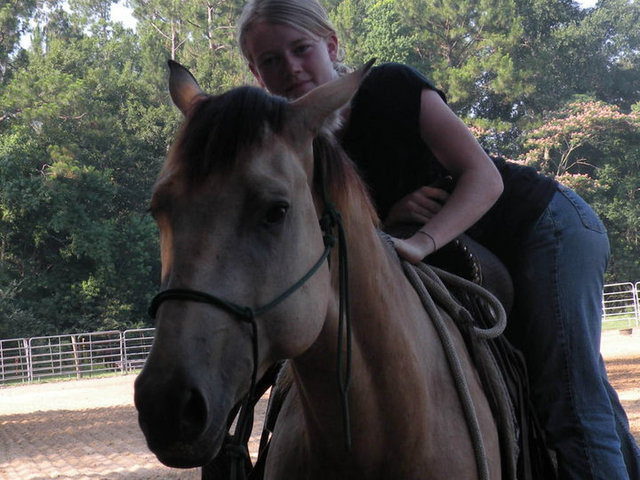
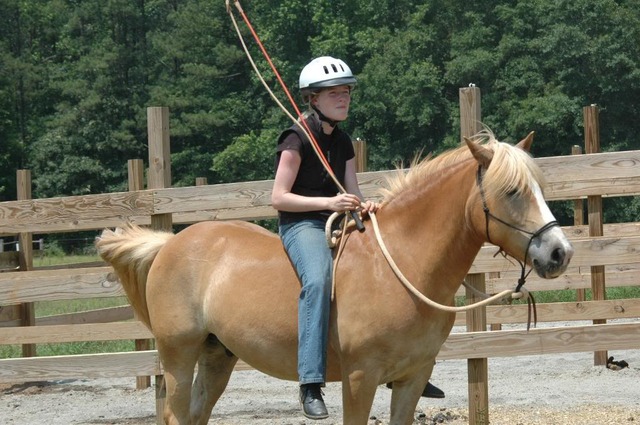
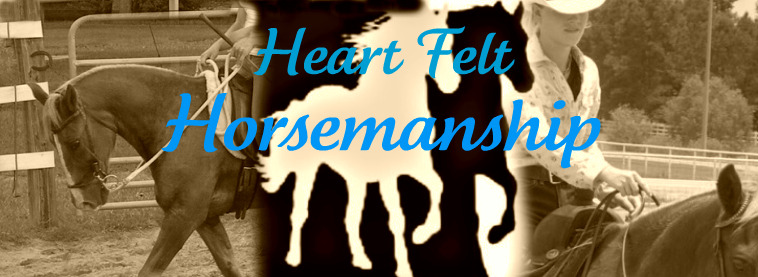
Lessons